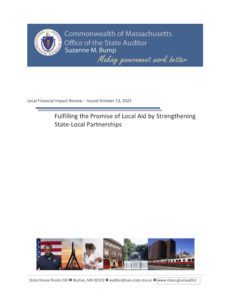Who is a member?
Our members are the local governments of Massachusetts and their elected and appointed leadership.
 A report released today by State Auditor Suzanne Bump identifies significant shortfalls in funding for state-mandated services and programs that cities and towns must provide as required by a variety of state laws.
A report released today by State Auditor Suzanne Bump identifies significant shortfalls in funding for state-mandated services and programs that cities and towns must provide as required by a variety of state laws.
While applauding the new funding for educational programs mandated by the Legislature in the current state budget, the report compared state appropriations to actual municipal spending on existing mandated programs and identified a shortfall of $1.2 billion.
Areas of concern include school transportation, aid to education, veterans’ benefits, and other essential, long-standing services in cities and towns.
The municipal impact study from the State Auditor’s Division of Local Mandates — titled “Fulfilling the Promise of Local Aid by Strengthening State-Local Partnerships” — also detailed inadequacies in existing formula distributions that result in glaring, unequal distributions to similarly situated communities.
“Every year, members of the Legislature file bills asking for an examination of unfunded mandates — what they are, how much they cost municipalities, and what can be done about them?,” Auditor Bump said in a statement. “This report, along with the published reviews of mandates passed by the Legislature which this office produces every five years, provides them with the information they need to address the burden of unfunded mandates. The solution … is to prioritize funding of them. It is a simple solution, but it may require some hard choices.”
Due to local revenue constraints set by Proposition 2½, state assistance is increasingly important to finance essential local programs, Bump said. Municipalities can be helped by “new growth” property tax revenue, but that is inconsistent across the state and dependent on the condition of the housing and commercial real estate markets, which are now under pressure due to higher interest rates.
“This report confirms that cities and towns are facing deep financial pressures, and explains why our communities rely so heavily on local aid and key municipal and school reimbursement programs,” said MMA Executive Director Geoff Beckwith. “Fortunately, progress is being made, and it’s important to underscore the partnership that cities and towns have with the Legislature. The fiscal 2023 state budget is a strong example of this, as the House and Senate moved quickly to increase Unrestricted General Government Aid, minimum school aid, special education reimbursements, charter school mitigation payments, and payments in lieu of taxes (PILOT) for state-owned land by levels far above the original budget filed by the governor, making real progress in closing funding gaps. The auditor’s report amplifies the critical importance of this funding, and local officials deeply appreciate lawmakers’ support going forward.”
The auditor’s report points out that municipal budgets depend on state aid and reimbursements to fund critical services. It is concerning, however, that support from the state continues to decline as a percentage of local budgets, reflecting a growing reliance on the property tax, which is capped by Proposition 2½. The report also warns that inflation is driving costs higher than the allowable growth in local revenues, making communities more reliant on adequate state reimbursements.
Some programs analyzed in the report are promised increases in resources, but there continue to be inequities across the state. Insufficient state appropriations remain the root of the problem for many programs, according to the report, and the devastating impact on municipalities continues to vary, based on a municipality’s size, demographics, location and economic characteristics.
School transportation programs
The report finds that a lack of state support continues to have a significant impact on many school districts, particularly in school transportation, where the local burden is $448 million.
The report found significant discrepancies regarding reimbursements from the state to municipalities, as required by law, for transporting in- and out-of-district students with special needs, those attending regional or vocational schools, and students in foster care. Improvements to fully support school transportation are necessary, the report states, and, although there have been increases in some areas, it is still lacking.
State and local revenue growth
Given the increased municipal reliance on the property tax to fund services at the local level and the growing financial burden of mandated services, the report finds that it is important that the state provide additional funding to communities. The report highlights key improvements in the fiscal 2023 state budget, such as a $500 million increase in Chapter 70 school aid due to provisions of the 2019 Student Opportunity Act, a $63 million increase in Unrestricted General Government Aid, a $67 million increase in the Special Education Circuit Breaker, and a $10 million increase for payments in lieu of taxes (PILOT) for state-owned land. These commitments, however, still leave substantial opportunities to strengthen the partnership between the state and local governments.
“There is still work to be done to reduce the burden facing municipalities,” Bump said. “This is particularly true for municipalities most in need of assistance.”
Beckwith applauded Auditor Bump’s report and the work of the Division of Local Mandates.
“This is an excellent blueprint that the incoming governor can use on Day One to set revenue sharing, local aid, and school funding targets to benefit every city and town,” he said.